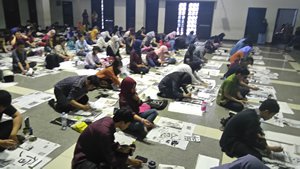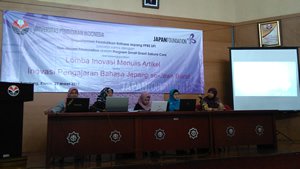The Flowing River Never Stops
Graduate School, Indonesia University of Education
TAHARA Yuka

The 43rd Japanese Language and Japanese Culture
Festival Shuji (Calligraphy) contest
In May 2017, the 43rd Japanese Language and Japanese Culture Festival was held at Padjadjaran University in the Sumedang Regency of West Java Province. It was run with the cooperation of eight universities in West Java Province that offer courses majoring in the Japanese language. The event is held once a year, and has been held for the past 43 years. It is called a culture festival, but it features various contests including speech, composition and Shuji (calligraphy) contests. The finest lineups of elite representatives from each university take part and compete with one another.
According to the Survey on Japanese-Language Education Abroad that The Japan Foundation carried out in 2015, Indonesia ranks second in the world for number of Japanese-language learners, at 745,125 people. Furthermore, 209,995 of those language learners are based in West Java Province. In addition, 199,249 of them, or 94.9%, are high school students. This number is of course the largest in Indonesia.
Due partly to these regional characteristics, Japanese-Language Specialists from The Japan Foundation have been dispatched to West Java Province for over 30 years. The specific content of their work varies depending on the timing, but the fundamental approach of “supporting Japanese-language education in West Java Province” remains unchanged. Since fiscal 2016 they have been called on to carry out activities that take into account all Japanese-language educational institutions in West Java Province, from the standpoint of “Regional Japanese-Language Specialists.”
The Indonesia University of Education Graduate School, where I am based, is the only graduate school in Indonesia where it is possible to obtain a Master’s degree in Japanese-language education. Graduates of the faculty of education can obtain a qualification as a teacher up to high school level, but obtaining a Master’s degree is advantageous. Furthermore, in order to teach Japanese at university it is necessary to obtain a Master’s degree or higher qualification. Consequently, the university attracts students from throughout Indonesia, not just the area around West Java Province. Training high-quality Japanese-language teachers is the most important challenge for the future of Japanese-language education in Indonesia.
There is another important job, and that is to improve the quality of the Japanese-language teachers who are currently teaching.

The Japanese-language teaching method contest
In March 2017, the Indonesia University of Education Graduate School held a Japanese-language teaching method contest. In it, high school teachers from West Java Province competed with “innovative” methods they had come up with for teaching the Japanese language. Naturally, one of the essential requirements was that the methods were “effective.” Various ideas were introduced, such as study methods that employed the Internet, including smartphones, and teaching methods that are aligned to the new curriculum.
This contest attracted participation from a broad range of generations, including not just young teachers who had just completed studying new theories at university, but also veteran teachers with some decades of teaching experience. Once individuals become “teachers,” the pressure of their day-to-day routine tasks and duties makes it quite difficult for them to come up with clever ways of teaching. However, thanks to West Java Province’s high-achieving veteran teachers, the young teachers also continue to proactively exchange information and to strive day after day.
The results of education do not appear in a short space of time. The outcome of more than 40 years of Japanese-language education has borne fruit in the form of a “number” – namely, No. 1 in Indonesia. Going forward, I want to see how “delicious” I can make this “fruit.” To put this another way, I want to continue to pursue activities aimed at improving “quality.”
- What We Do Top
- Arts and Cultural Exchange [Culture]
- Japanese-Language Education Overseas [Language]
- Japanese-Language Education Overseas [Language] Top
- Learn Japanese-language
- Teach Japanese-language
- Take Japanese-Language Test
- Know about Japanese-language education abroad
- The Japanese-Language Institute, Urawa
- The Japanese-Language Institute, Kansai
- Japanese-Language Programs for Foreign Specified Skilled Worker Candidates
- Japanese Language Education for Japanese Children Resident Overseas and for the Descendants of Migrants
- Archives
- Japanese Studies and Global Partnerships [Dialogue]
- JF digital collection
- Other Programs / Programs to Commemorate Exchange Year
- Awards and Prizes
- Publications
